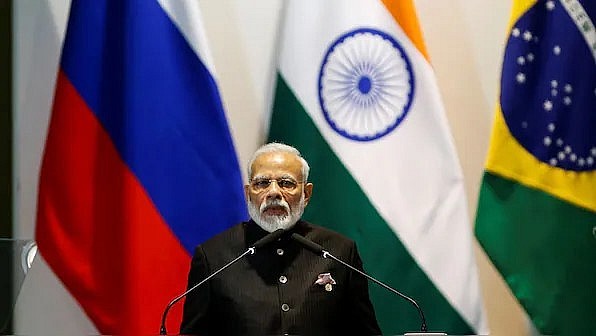
|
| Prime Minister Narendra Modi will attend the BRICS Summit in Russia. File Photo/Reuters |
The upcoming BRICS meeting in Kazan, Russia, on October 22–23, 2024, comes at a pivotal moment in international geopolitics. This gathering follows a relatively low-key Shanghai Cooperation Organization summit in Islamabad earlier this month, which was notably absent of Prime Minister Narendra Modi, President Xi Jinping, and President Vladimir Putin.
With ongoing conflicts in Ukraine and the Middle East, coupled with leadership uncertainties in the US, rising oil prices, and economic tensions, the current global situation presents significant challenges. Additionally, Russia and China’s reluctance to engage in the Middle East further complicates the landscape.
Prime Minister Narendra Modi’s presence at the BRICS summit is of utmost importance. He has consistently attended these summits due to their significant social, economic, and geopolitical implications. BRICS represents a powerful bloc of emerging economies that can shape global governance. With the recent addition of new members, BRICS now covers a substantial land area and accounts for nearly half of the global population.
India recognizes the potential for strengthened trade and investment ties within BRICS. The combined GDP of BRICS nations stands at a significant proportion of global GDP, and India can benefit from enhanced collaboration in areas such as energy, technology, and infrastructure development. By engaging in multilateral initiatives, India diversifies its trade relationships, accesses new markets and technologies, solidifies its position as a leading emerging economy, and simultaneously increases its global influence.
The New Development Bank (NDB), established by BRICS, has been instrumental in approving numerous projects worth billions of dollars, with India as a major beneficiary. The NDB’s focus on infrastructure, renewable energy, and urban development drives economic growth and job creation. India played a pivotal role in the establishment of the NDB and has reaped considerable benefits, particularly in the form of investments in renewable energy, transportation, water and sanitation, and urban development projects.
On the social front, BRICS has facilitated valuable collaborations in education, healthcare, and cultural exchanges. Initiatives like the BRICS Network University promote student and faculty exchanges and foster joint research projects. Geopolitically, BRICS provides a platform for South-South cooperation, allowing India to address pressing issues such as terrorism, climate change, and sustainable development. It also enhances India’s global influence and amplifies its voice in other international forums.
Prime Minister Modi, building on India’s successful G20 presidency in 2023, will focus on enhancing BRICS cooperation in trade, investment, and energy—crucial aspects of India’s development agenda for Viksit Bharat 2047. The discussions will revolve around reforming international financial institutions, promoting sustainable development, and addressing economic inequality. India will emphasize the importance of cooperation among emerging economies, fostering development, and economic growth through partnerships and knowledge-sharing.
Additionally, Prime Minister Modi is expected to attend the G20 Summit in Rio de Janeiro, Brazil, on November 18–19, 2024. With the theme ‘Building a Just World and a Sustainable Planet’, there will be several areas of convergence between the two summits. These include the implementation of the Sustainable Development Goals Agenda 2030, restructuring global economic institutions, strengthening the rule-based global trading system, and promoting skilled professional mobility. Climate change will also be a key area of discussion, focusing on climate finance, technology transfer, and clean energy research.
The bilaterals on the sidelines of the summit will undoubtedly attract attention. Prime Minister Modi is expected to engage in one-on-one meetings, including with his host, President Putin. With his second visit to Russia this year and his positive rapport with the Russian President, the world anticipates the Indian PM to encourage his Russian counterpart to reconsider the Ukraine war. While this may not be a priority on the Indian agenda, energy security and defense relationships will be significant topics.
At this point, there is no indication of a potential meeting between Prime Minister Modi and President Xi Jinping. If such an encounter occurs, it could become a highlight for the Indian news media. Trade and Economic Cooperation would be a significant agenda item, given India’s growing trade deficit with China. Prime Minister Modi may advocate for increased Chinese investment in sectors like infrastructure and technology. Border disputes along the Line of Actual Control (LAC) remain a point of contention and could be addressed by the leaders in an effort to ease tensions.
In recent months, China has signaled its willingness to pursue a more cooperative relationship with India, which could lead to improved stability. However, it is still early to speculate, as these desired meetings may or may not materialize. We can only hope for productive engagements that contribute to global stability and cooperation.
The Prime Minister’s Overseas Adventure: Singapore and Brunei Darussalam Charm Offensive
Indian Prime Minister Narendra Modi is set to embark on a two-day official visit to the nation of Brunei Darussalam on the invitation of Sultan Haji Hassanal Bolkiah. This significant trip is scheduled for the 3rd and 4th of September, a short yet impactful visit that underscores the growing ties between the two nations.
“Hope for a Swift Return to Normalcy”: PM Modi to Bangladesh’s Interim Govt. Head, Muhammad Yunus
Prime Minister Narendra Modi extended his warmest wishes to Professor Muhammad Yunus on his recent appointment as the head of Bangladesh’s interim government. In a gesture of goodwill and cooperation, Prime Minister Modi emphasized the importance of a swift return to stability and peace, particularly for the Hindu minority community in Bangladesh. With Professor Yunus at the helm, there is a unique opportunity to foster an inclusive and harmonious environment, ensuring the protection and well-being of all citizens, regardless of their religious or cultural background.
The Magic of Modi Enchants Times Square: A Celebration of India’s Rise and Unity by Global Faith Leaders and the Diaspora
Religious leaders from minority communities and the Indian Diaspora in the United States have commended Prime Minister Narendra Modi for his commitment to inclusive growth and empowerment of minorities in India. Over the past decade, under Modi’s leadership, these communities have thrived and become equal partners in the nation’s remarkable global ascent. Their praise underscores the successful integration and progress of minority groups, highlighting Modi’s dedication to ensuring their equal participation in India’s journey towards becoming a global powerhouse.
‘India and Russia Forge Ahead with the Chennai-Vladivostok Eastern Maritime Corridor’
Addressing the Indian diaspora in Russia, Prime Minister Narendra Modi delivered an uplifting message on Tuesday during a community program in Moscow. He proudly announced the collaborative efforts between India and Russia, highlighting their joint venture—the Chennai-Vladivostok Eastern Maritime Corridor. With a visionary perspective, PM Modi painted a picture of two great civilizations connecting through the Ganga-Volga dialogue, discovering each other’s rich cultures and histories.
The Ancient Knowledge Network: Reviving Nalanda, Reconnecting India’s Illustrious Past with the World
The revival of Nalanda, a moment long-awaited, has breathed new life into the world’s first residential university. With the inauguration of the new campus by Prime Minister Narendra Modi, Nalanda University in Bihar’s Rajgir is rising again, nestled a stone’s throw away from the ancient Nalanda Mahavihara, now a UNESCO World Heritage site.








